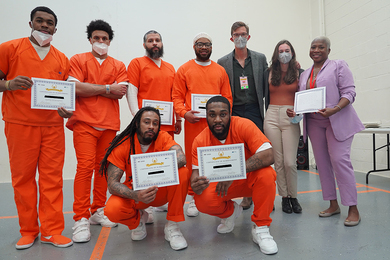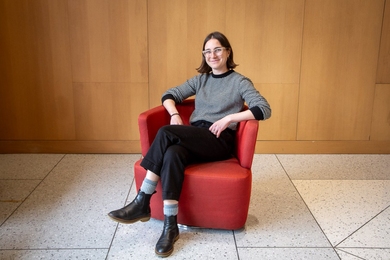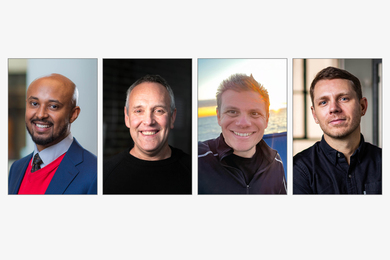Under a steady rain that soaked guests, graduates and anti-World Bank demonstrators, World Bank President James D. Wolfensohn told the Class of 2002 on Friday that social and economic equity "is your issue."
Wolfensohn delivered the principal address to 2,187 graduates at MIT's 136th Commencement in Killian Court in front of a sea of dripping mortarboards and multicolored umbrellas while about 120 protesters gathered on the opposite side of Memorial Drive.
Deflecting the claims of the protesters, Wolfensohn spoke in broad terms about personal responsibility. The events of Sept. 11, plus the globalization and general "shrinking of the world" that has occurred in the past 40 years, has shaken the notion that anyone, including himself, could live "behind the wall," he said. Crime, health, communications and terror affect both developed and developing countries, he said.
"My message to you today is: whatever your judgment of institutions like the Bank or of people from my generation, your challenge is planetary equity," he said.
He urged the graduates to use their education and experience to address global equity. "You cannot avoid it," he said. "It's the issue of peace, and all of you here have been trained to make our world a better place. I have great confidence that you will do that, and I hope that as you go forward you will give thought not to the World Bank but to the issue of equity, social justice, poverty and peace."
Calling MIT's OpenCourseWare initiative "the greatest advance this institution has made," Wolfensohn said that making MIT course materials available freely over the World Wide Web will benefit many, especially through entities such as the World Bank's African Virtual University. "From my point of view, working in the Bank, this contribution may well be the greatest thing you've ever done," he said.
As Wolfensohn began speaking, some graduating students held up red sheets of paper labeled "World Bank Grade: F." The sheet's "instructions for use," in tiny type along the bottom, were, "This is your last hack. Be bold. Hold up your report card when Wolfensohn uses the usual hollow rhetoric." Examples of "hollow rhetoric terms" included poverty, development, privatization, progress, health and environment.
Wolfensohn joked that he had gotten "too many grade cards with F on them" when he attended the University of Sydney in his native Australia. He asked the students to refrain from holding up the cards to allow him to retain some "personal dignity." A student in the front row promptly complied.
Wolfensohn said that when he graduated 40 years ago, he saw the world as a "bipolar world: rich and poor, developed and developing, north and south--a world that was divided." He saw his own career in personal terms--he was interested in "dealing with issues of my own personal poverty," but he also felt he had a moral and ethical obligation to take an interest in less fortunate people in the developing world. He figured he would "give part of my life to the other part of the world and then go back behind my wall."
That all changed, he said, as globalization made the world a smaller place where the issues that affect some can affect all. Of the planet's 6 billion people, 5 billion live in developing countries and 3 billion live on less than $2 a day--numbers he said that will increase in coming years as the world's population reaches 8 billion.
This inequity, Wolfensohn said, reflects itself in uncertainty and "finds its evidence in hostility, reaction and a sense of abandonment. This instability is not a situation that can continue."
VEST'S CHARGE
In his address to the graduates, President Charles M. Vest said that in the post-Sept. 11 era, universities need to keep their doors open to foreign students and faculty. "Since you arrived at MIT, we have moved from the closing years of the 20th century into the opening years of the 21st," he said. "We have moved from predictions to realities. The end of science was proclaimed; the Internet bubble burst; and we suffered a national trauma at the hands of murderous terrorists." Despite these developments, he said, "This is a time to sustain opportunity and openness."
Vest said he is optimistic about the future. "We are entering an era of unprecedented scientific and technological opportunity. You are part of this transformation. Indeed, many of you will make it your life's work--placing science and technology in the service of humankind," he said.
'MORE WORLD, LESS BANK'
After marching across the Massachusetts Avenue bridge from Boston, escorted by state police on motorcycles on the bridge and in boats on the Charles River, protesters gathered behind a 1,000-foot barrier of chained bicycle racks on Memorial Drive across from Killian Court.
The group--a handful of MIT students among them--marched to the beat of six vigorous drummers and carried large banners saying, "More World, Less Bank" and "Not for Sale," with a picture of Earth bisected by a slash.
State troopers and Cambridge police officers directed the group to the river's edge. Troopers on horseback, motorcycles and in boats with twin 150-hp engines kept close watch on them as the MIT faculty and graduating students proceeded into Killian Court.
The protesters' criticism of World Bank economic policies alternated between chanting--"What do we want? Cut the debt! When do we want it? Now!"--and statements by individuals on poverty, hunger and pollution in specific countries. Protesters at the end of the procession displayed a huge "report card" on the World Bank, grading it "F" in education and accountability.
Payal Parekh, a graduate student in earth, atmospheric and planetary sciences, took up the megaphone to challenge her fellow students. "I'm glad I'm not graduating today with Wolfensohn speaking," she said. "We are not here today to pat the elite on the back. We believe an alternative world is possible. This better world will embody principles such as human rights, justice, dignity and democracy for all."
Some MIT graduates marching into the court chanted to the protesters' beat: "What do we want? Sunshine! When do we want it? Now!"
A version of this article appeared in MIT Tech Talk on June 12, 2002.







